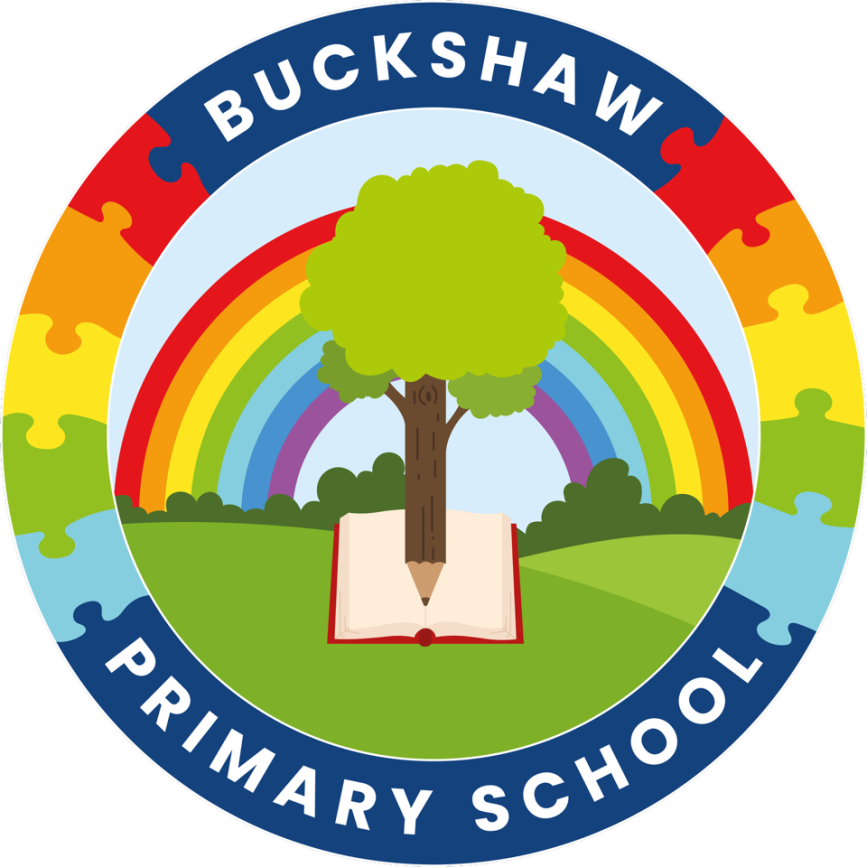English
Intent
At Buckshaw Primary School, we strive for excellence in English achievement throughout the school. We aim to deliver a high-quality curriculum which will teach pupils to have a strong command of the spoken and written word so that they can communicate their ideas and emotions to others and, through their reading and listening, others can communicate with them. Through reading in particular, pupils have a chance to develop culturally, emotionally, intellectually, socially and spiritually. Literature, especially, plays a key role in such development. Reading also enables pupils both to acquire knowledge and to build on what they already know. We believe that developing a love of language is essential to achieving success at school and participating fully as a member of society.
Buckshaw Primary School aims to ensure that all pupils:
- Learn how to read and write with fluency, understanding and confidence.
- Are encouraged to develop a love of reading and to read widely and for enjoyment.
- Appreciate our rich and varied literary heritage.
- Acquire a wide vocabulary, an understanding of grammar and knowledge of linguistic conventions for reading, writing and spoken language.
- Experience a range of text/media types and genres, across a range of contexts, to develop their understanding.
- Write clearly, accurately and coherently, adapting their language and style in and for a range of contexts, purposes and audiences.
- Learn how to apply grammatical terminology in their own writing.
- Are competent in the arts of speaking and listening, making formal presentations, demonstrating to others and participating in debate.
Implementation
From Nursery to Year Six, the school is part of the Lancashire Talk Project, which ensures high quality input and resources are in use throughout school and lessons are delivered by well-trained staff. Children explore a variety of genres and themes. They study fiction and non-fiction and begin to compare characteristic features of writing. Children learn how to apply these features in their own writing and develop stamina to write at length.
In EYFS, children have daily Phonics lessons through Red Rose Letters and Sounds Phonics to develop the skills of blending and segmenting in preparation for early reading and writing. A wide range of exciting learning areas provide children with opportunities to develop their communication, language and literacy skills on a daily basis with a focus on child-initiated activities. As well as a writing area, which provides children with a range of materials with which to experiment and practice mark making/letter formation (and eventually to practice taught skills), other learning areas provide children with the opportunity to read and write in a range of contexts.
A range of resources in the outdoor area, including a mud kitchen, provide valuable opportunities to engage children in writing for pleasure. Children also have access to a vast range of texts, including fiction and non-fiction. Writing skills are developed across the curriculum and children are given lots of opportunities for cross-curricular writing.
In Key Stage 1, Red Rose Letters and Sounds Phonics lessons are continued until children are secure at Phase 5. In Year 2, children participate in Red Rose Spelling lessons to learn how to apply their knowledge of phonemes and graphemes to spelling patterns and rules.
In both Key Stages One and Two, planning for English follows the Lancashire units of work or Talk Project resources and consists of three phases: the reading phase; ideas phase and writing phase. Each unit is planned with a set outcome; ensuring learners apply what is learnt in a meaningful way.
Guided reading sessions take place daily and children have 1:1 reading sessions. We use high quality phonetically decodable texts from a variety of publishers that are closely matched to children’s phonic ability. We develop both reading fluency and reading comprehension. Children are encouraged to develop a love for reading through daily story time.
In Key Stage 2, children have English lessons in which they focus on a range of text types throughout the year. During Key Stage 2, children can expect to tackle a range of writing tasks, including (but not limited to): myths and legends, adventure stories, mysteries, play scripts, biographies, recounts, debates and journalistic writing. English, Spelling, Punctuation and Grammar is taught discreetly in daily sessions.
Impact
Through our teaching philosophy, we feel that Buckshaw Primary School teaches an English curriculum that enables children to make progress, engage in sustained learning and develop multiple key skills.
Reading at Buckshaw Primary School is progressive and planned to meet the needs of all children. Assessments are carried out regularly to ensure children are accessing books of the right level and are being challenged in their reading. At the same time, we provide books and incentives to ensure that children read for pleasure and learn to love reading.
We measure the impact of our curriculum through the following methods:
- Phonics assessment on Phonics Tracker
- Phonics screening results
- Book band colours
- Summative assessments each term
- End of Key stage SATs results
In writing, assessment for learning strategies are used on a daily basis. These allow a personalised picture to be built of the pupils’ progress. Areas of strength or weakness can then be addressed in teachers’ planning. Children complete independent writing pieces within a unit of work, which are assessed against using Lancashire KLIPS, which focus on the acquisition of the key skills and strategies needed to be a successful writer. Analysis of the data impacts upon teachers' planning so pupils’ needs can be addressed. Moderation of teacher assessment ensures that judgements are accurate. Children who are not on track to make expected progress are quickly identified for intervention.
At the end of KS1 and KS2 teachers use the Teacher Assessment Framework to report teacher assessment.
